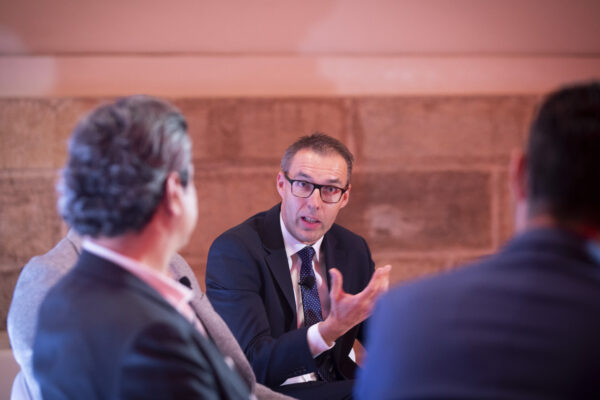“Portugal needs to react to demand by developing and producing batteries”
João Galamba, the Secretary of State for the Environment and Energy, argued that the battery value chain is of particular iJoão Galamba, the Secretary of State for the Environment and Energy, argued that the battery value chain is of particular importance within the context of energy transition. importance within the context of energy transition.
E-mobility is a hot button topic in Portugal and throughout the European Union, and the Portuguese government is strongly committed to its development. This was how João Galamba, the Secretary of State for the Environment and Energy, commenced his conference speech, adding that batteries are crucial for digital and energy transitions. “It’s no exaggeration to say that they are vital to fulfilling the greatest goal societies are facing: achieving carbon neutrality by 2050.” Indeed, he considers this the core aspect of the European Green Deal, following a new development strategy and a roadmap to make Europe sustainable.
Despite the added challenges brought on by the pandemic and the war, João Galamba assured the audience that the Government is keeping its commitment to becoming carbon neutral by 2050. “We will continue to keep pursuing the goals set out in the European Green Deal and aiming towards energy transition.”
Emphasising the fact that the world population is estimated to reach 10 billion by 2050, he stated that the population has doubled over the last five decades, while resource extraction tripled. “When 45% of emissions come from the production and consumption of goods and services, we have to think about how we extract, produce and consume, if we want to hit the 2025 carbon neutrality goal.”
Sustainability of value chains is key
João Galamba asserted that the sustainability of value chains is becoming increasingly important, particularly the battery value chain within the context of energy transition. “According to European Union estimates, from 2025 the battery value chain in Europe will rise by 250 billion euros per year”, and the data he presented showed that 20 gigafactories will be required in Europe to meet EU demand alone. “The scale and speed needed demand a joint effort so that we can rise to this industrial challenge.”
At a moment in time which João Galamba considers “crucial” for Portugal and Europe, he warned of the need to “be able to react to increasing demand by developing and producing batteries, without compromising the goals set out in the European Green Deal and the Circular Economy Action Plan. In fact, he insisted that the European Green Deal is vital to ensuring that the economies of the European Union (EU) move towards sustainability and recovery. “But I will add that in the European Green Deal the traditional divisions, oppositions and rifts between the economy, industry and the environment are brought to the fore. So while it’s true that industry has to be more sustainable, it’s also true that the environment has to be more industrial.”
The challenges
The Secretary of State went on to say that the commitment to sustainability will allow climate and environmental goals to be met, while at the same time promoting economic development and guaranteeing a fair and inclusive recovery. “The path towards carbon neutrality also entails a rapid use of a linear model, based on fossil fuels, and a circular model which is carbon-neutral and respects Earth’s limits.”
He pointed out that there are three main challenges to developing the battery value chain in Portugal in line with the needs of the market: access to critical raw materials, skills and investment. “And Portugal is particularly well prepared to meet these challenges.” João Galamba also spoke about lithium prospecting and granting rights in Portugal, and that this has already undergone a strategic environmental assessment process which identified six areas which potentially hold lithium deposits. A tender is expected to be opened later this year.











